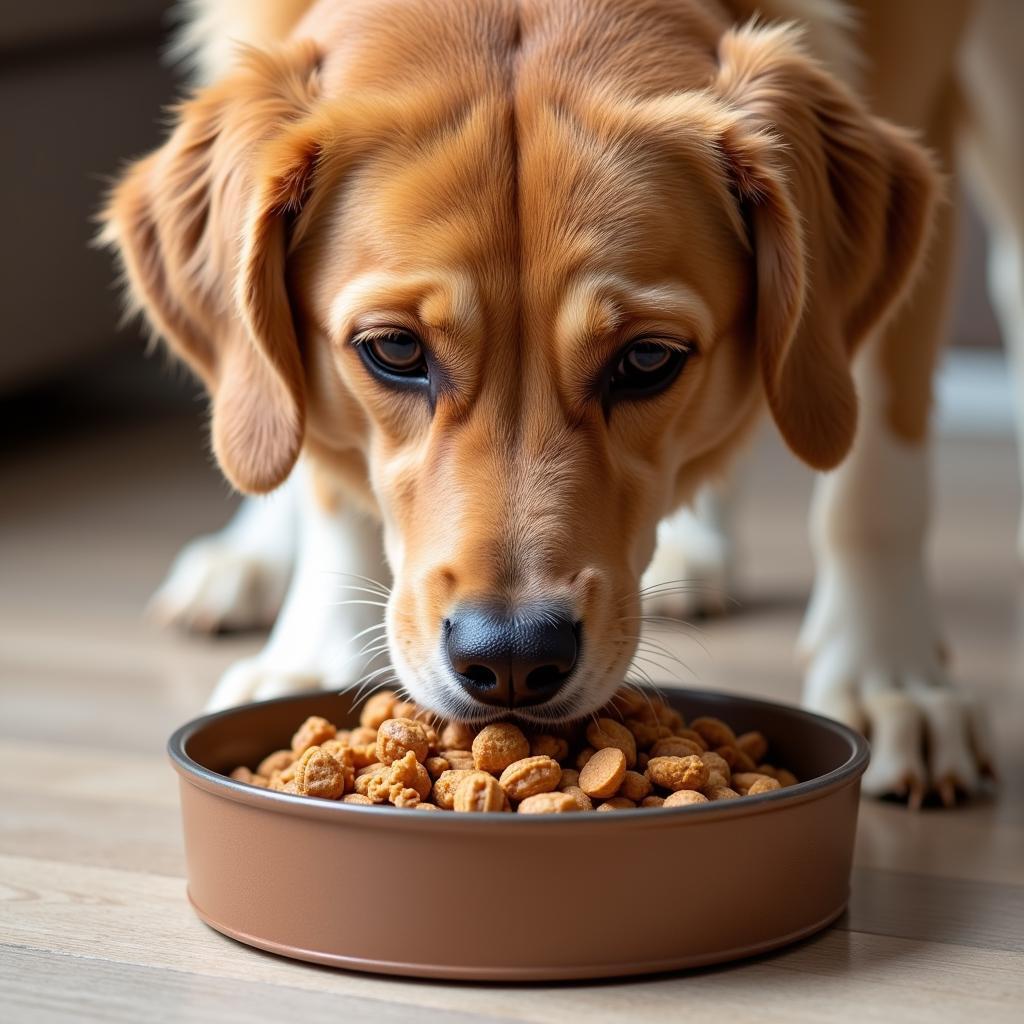Helping your dog gain weight healthily requires a comprehensive understanding of their nutritional needs and the right Dog Weight Gain Food. This guide explores various strategies, including dietary adjustments, exercise modifications, and understanding underlying health conditions that might be contributing to your dog’s low weight. We’ll delve into the specifics of choosing the best food for dogs to gain weight, covering crucial aspects such as calorie density, protein content, and essential fatty acids.  A happy dog enjoying a bowl of nutritious weight gain food.
A happy dog enjoying a bowl of nutritious weight gain food.
Choosing the Right Dog Weight Gain Food
Selecting appropriate dog weight gain food is crucial for healthy weight gain. Look for foods with higher calorie density, meaning more calories per serving. This allows your dog to consume enough energy without overfilling their stomach. Increased protein content is also essential for building muscle mass during weight gain. Don’t forget essential fatty acids like omega-3 and omega-6, which contribute to a healthy coat and skin, further indicating overall well-being. Consider food for dogs to gain weight specifically formulated to address these needs.
Understanding Calorie Needs for Weight Gain
Each dog’s calorie requirements are unique and depend on factors like breed, age, activity level, and metabolism. Consulting with a veterinarian is crucial to determine the appropriate caloric intake for your dog’s specific situation. They can assess your dog’s current body condition and recommend a tailored feeding plan.
Boosting Calorie Intake with Healthy Additions
Beyond specialized dog weight gain food, there are several healthy ways to boost your dog’s calorie intake. Adding dog food toppers for weight gain can make their meals more enticing and calorie-rich. Consider options like cooked chicken, lean ground beef, or healthy fats like fish oil. Remember moderation is key; ensure any additions complement their primary diet and don’t disrupt their nutritional balance.
Homemade Dog Food for Weight Gain
For those inclined towards homemade diets, crafting specialized meals can be a viable option. However, it’s crucial to consult with a veterinary nutritionist to ensure the diet meets all your dog’s nutritional requirements. A balanced homemade diet should include appropriate proportions of protein, carbohydrates, fats, vitamins, and minerals.
Addressing Underlying Health Issues
Sometimes, underlying health conditions can contribute to weight loss or difficulty gaining weight. Parasites, digestive issues, or metabolic disorders can affect a dog’s appetite and nutrient absorption. best food for dogs to gain weight can be beneficial, but addressing any underlying health concerns is paramount. A veterinarian can diagnose these issues and recommend appropriate treatment and dietary adjustments.
Monitoring Progress and Adjustments
Regularly monitoring your dog’s weight and body condition is essential during the weight gain process. Keep track of their food intake and adjust portions as needed. Consult with your veterinarian if you notice any unexpected changes or if your dog isn’t gaining weight as anticipated.
“Consistent monitoring and adjustments are crucial for successful weight gain. Don’t hesitate to reach out to your vet for guidance throughout the process.” – Dr. Emily Carter, DVM
“Choosing the right dog weight gain food is the foundation of a healthy weight gain journey. Focus on nutrient-dense options that support overall well-being.” – Dr. Michael Davis, PhD, Animal Nutritionist
Conclusion
Successfully helping your dog gain weight involves a multifaceted approach that includes choosing the right dog weight gain food, boosting calorie intake strategically, addressing any underlying health concerns, and monitoring progress. By following these guidelines and working closely with your veterinarian, you can ensure your canine companion achieves and maintains a healthy weight. If you have a large breed dog, you may consider large breed salmon dog food. While this article focuses on dog food, we also have resources for cat owners, such as information on diamond naturals active cat food.
FAQ
- How can I tell if my dog is underweight?
- What are the best dog food toppers for weight gain?
- How much weight should my dog gain per week?
- Can I give my dog human food to help them gain weight?
- What are the signs of a healthy weight gain?
- How often should I weigh my dog during the weight gain process?
- When should I consult a vet about my dog’s weight?
For further assistance, please contact us at Phone Number: 02437655121, Email: [email protected] Or visit our address: 3PGH+8R9, ĐT70A, thôn Trung, Bắc Từ Liêm, Hà Nội, Việt Nam. We have a 24/7 customer service team.